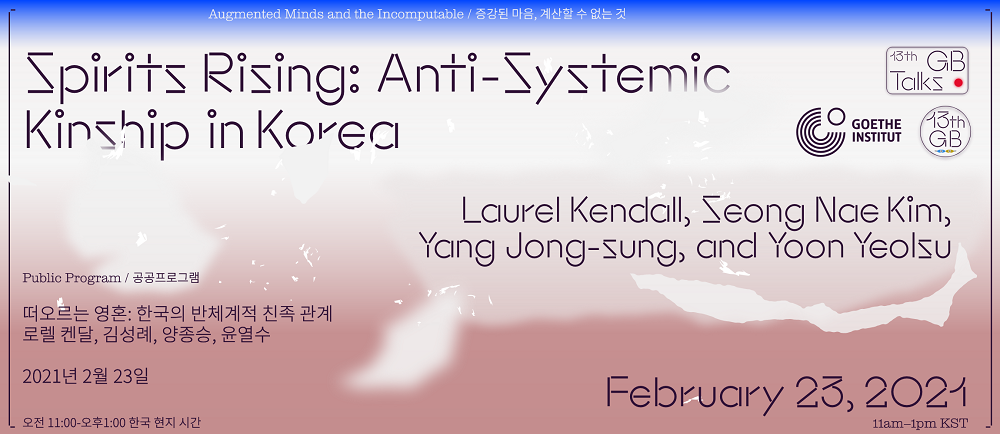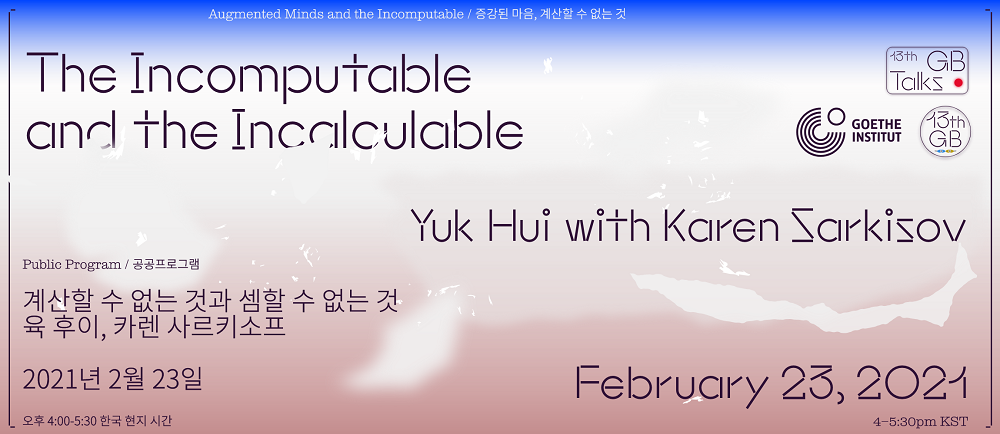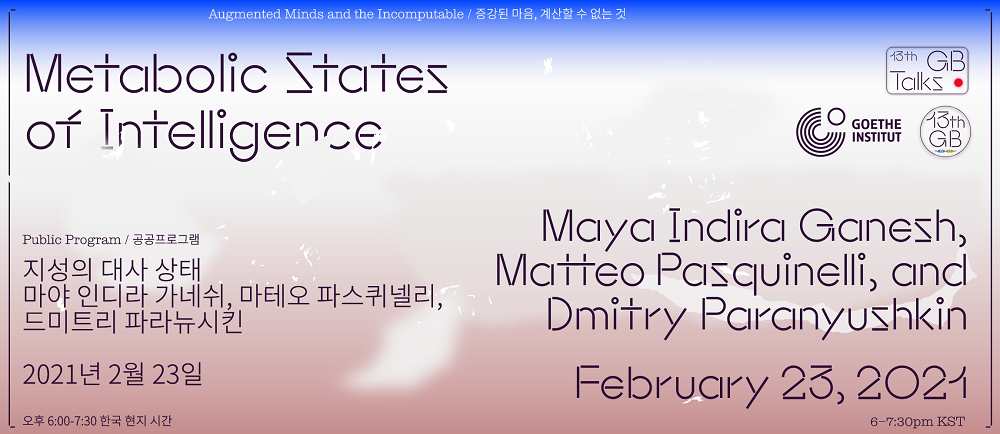Calendar
Events·Programs
Augmented Minds and the Incomputable
Public Program
“Augmented Minds and the Incomputable” interweaves the exhibition’s generative topics, examining the spectrum of the extended mind and challenging the structural divisions imposed upon corporeal, technological, and spiritual intelligence. This program invites philosophers, system thinkers, and researchers to discuss shamanism, cosmotechnics, neuroscience, and digital labor in relation with Korea’s visual cultures and communal trauma. The three sessions explore non-hierarchical approaches to replenish the body-mind during this time of massive suffering and mobilize plural and coeval conditions of being and belonging.
Spirits Rising: Anti-Systemic Kinship in Korea
Laurel Kendall, Seong Nae Kim, Yang Jong-sung, Yoon Yeolsu
February 23, 11am–1pm KST
Join us on Zoom by clicking here (Zoom Webinar ID: 971 0878 5224) or on the Gwangju Biennale Foundation’s Facebook page.
 “Spirits Rising:
Anti-Systemic Kinship in Korea” investigates somatic practices, ritual systems,
and formations of collective care as they relate to shamanism across the
divided Korean peninsula and its transgressive potential. Laurel Kendall,
anthropologist and curator, discusses the work of Korean shamans as a living
and vital social practice that addresses the changing needs and anxieties of
living people. She describes how painted images work with the shaman as seats
for the mansin’s personal gods. Yang Jong-sung, director of The Museum
of Shamanism, introduces the ceremonial forms and relics on display in the
Biennale exhibition, including amulets, rare Kut manuals, and paintings and
details their engagement with grievances at the root of communal bonds through
gods, as well as social inequality and collective trauma. Yoon Yeolsu, director
of the Gahoe Minhwa Museum, presents a selection of folk paintings and
religious amulets to propose the timeliness of examining practices of
countryside rituals and oral storytelling. Academic Seong Nae Kim discusses the
ways in which the legacies of the Jeju 4.3 are transmitted across generations
and ritually reenacted in post-memory practices through spirit possessions,
ancestral familial rites, and public shamanic commemorations to revive social
trust and allow for pathways into of anti-systemic kinship across class and
ethnic divides.
“Spirits Rising:
Anti-Systemic Kinship in Korea” investigates somatic practices, ritual systems,
and formations of collective care as they relate to shamanism across the
divided Korean peninsula and its transgressive potential. Laurel Kendall,
anthropologist and curator, discusses the work of Korean shamans as a living
and vital social practice that addresses the changing needs and anxieties of
living people. She describes how painted images work with the shaman as seats
for the mansin’s personal gods. Yang Jong-sung, director of The Museum
of Shamanism, introduces the ceremonial forms and relics on display in the
Biennale exhibition, including amulets, rare Kut manuals, and paintings and
details their engagement with grievances at the root of communal bonds through
gods, as well as social inequality and collective trauma. Yoon Yeolsu, director
of the Gahoe Minhwa Museum, presents a selection of folk paintings and
religious amulets to propose the timeliness of examining practices of
countryside rituals and oral storytelling. Academic Seong Nae Kim discusses the
ways in which the legacies of the Jeju 4.3 are transmitted across generations
and ritually reenacted in post-memory practices through spirit possessions,
ancestral familial rites, and public shamanic commemorations to revive social
trust and allow for pathways into of anti-systemic kinship across class and
ethnic divides.
The Incomputable and the Incalculable
Yuk Hui with Karen Sarkisov
February 23, 4–5:30pm KST
Join us on Zoom by clicking here (Zoom Webinar ID: 987 9167 8365) or here.
 The Incomputable and the
Incalculable” features a lecture by philosopher Yuk Hui that draws on the
concept of recursivity as a novel way of tracing the history of modern western
philosophy, one in which twentieth-century computational theory seems to
vindicate the intuitions of the German Romantics and Idealists about the inner
workings of the world and nature. But is everything reducible to recursive
algorithms and therefore computable? Does this rationalization not run the risk
of ultimately making the world itself disappear? How do we distinguish between
what is computable, incomputable and what is incalculable? Does the
incalculable merely gesture towards a mysticism or does it in the contrary
reveal a new form of rationalization? A conversation with curator Karen
Sarkisov will discuss the notion of incalculability and its relation to the
current technological paradigm.
The Incomputable and the
Incalculable” features a lecture by philosopher Yuk Hui that draws on the
concept of recursivity as a novel way of tracing the history of modern western
philosophy, one in which twentieth-century computational theory seems to
vindicate the intuitions of the German Romantics and Idealists about the inner
workings of the world and nature. But is everything reducible to recursive
algorithms and therefore computable? Does this rationalization not run the risk
of ultimately making the world itself disappear? How do we distinguish between
what is computable, incomputable and what is incalculable? Does the
incalculable merely gesture towards a mysticism or does it in the contrary
reveal a new form of rationalization? A conversation with curator Karen
Sarkisov will discuss the notion of incalculability and its relation to the
current technological paradigm.
Metabolic States of Intelligence
With Maya Indira Ganesh, Matteo Pasquinelli, and Dmitry Paranyushkin
February 23, 6–7:30 p.m. KST
Join us on Zoom by clicking here (Zoom Webinar ID: 991 8733 3940) or here.
 “Metabolic States of
Intelligence” inquires into machine intelligence and the extended mind explored
through philosophical and ethical implications of algorithmically generated
information feeds as learning and coping mechanisms today. Technology
researcher and writer Maya Indira Ganesh examines the poetics and politics of
AI metaphors and asks from where and how new metaphors might arise. Philosopher
Matteo Pasquinelli discusses his research around the plurality of knowledge
models in the age of “monotheistic” AI. Biennale participant and choreographer
Dmitry Paranyushkin introduces the idea of dynamic diversity through networked
mapping and corporeal techniques while centralizing characteristics of immunity
and resilience today.
“Metabolic States of
Intelligence” inquires into machine intelligence and the extended mind explored
through philosophical and ethical implications of algorithmically generated
information feeds as learning and coping mechanisms today. Technology
researcher and writer Maya Indira Ganesh examines the poetics and politics of
AI metaphors and asks from where and how new metaphors might arise. Philosopher
Matteo Pasquinelli discusses his research around the plurality of knowledge
models in the age of “monotheistic” AI. Biennale participant and choreographer
Dmitry Paranyushkin introduces the idea of dynamic diversity through networked
mapping and corporeal techniques while centralizing characteristics of immunity
and resilience today.